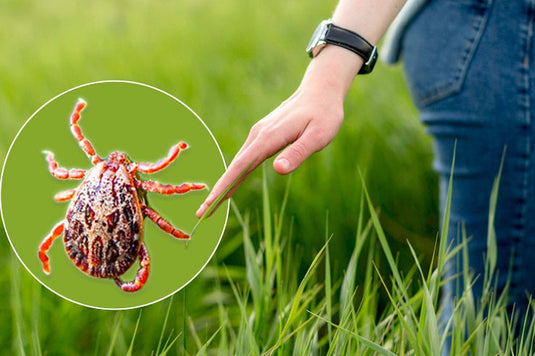Continued article: “Anthony William reveals the truth about Lyme disease (part 1)”
Anthony William explains the role of antibiotics in Lyme disease symptoms
The medical community's mistaken belief that Lyme disease is caused by bacteria (and more recently, parasites) is one of the greatest mistakes in modern medical history. It has prevented so many generations of people struggling with viral infections from getting the real help they need. Anthony William calls this the "Lyme trap."
The way doctors usually deal with Lyme disease is to prescribe antibiotics because they are meant to kill Borrelia burgdorferi and other bacteria like Bartonella, as well as parasites like Babesia, which actually have nothing to do with Lyme disease and pose no health threat. Borrelia, Bartonella, and Babesia do not attack the central nervous system, and symptoms of an inflamed central nervous system are the number one problem among all Lyme disease patients. This is now being diagnosed as neurological Lyme disease. Until the medical community learns the truth, they will continue to prescribe antibiotics for Lyme disease that do not give positive results and leave behind damage. This is not only ineffective, it is also dangerous!
Powerful antibiotics deal a double whammy to Lyme disease sufferers. Because Lyme disease patients typically have an inflamed neurological system from viral infections in the herpes family , these harsh antibiotics damage already sensitive nerves. Some doctors are left with the mistaken impression that the pain and other symptoms a patient experiences in these circumstances are a sign of progress—an indication of what is known as the Jarisch-Herxheimer reaction, a bacterial die-off as the body detoxifies. Borrelia, Bartonella, and Babesia are easy to kill. In reality, the symptoms indicate that something else is seriously wrong.
Antibiotics are generally hard on the gut and liver. They can also kill the good bacteria in your gut that are part of maintaining a balanced gut flora. If your doctor puts you on an aggressive antibiotic for two or more weeks, then even if you take probiotics daily, it can take a year or more for your gut to recover from the damage. Some intestines will never be the same again, even if the antibiotic is given intravenously. The liver tends to absorb and store antibiotics, which causes short-term shock and stress to that organ. Storing antibiotics in the liver can also fuel the viral infection responsible for Lyme disease.
The viruses that cause the symptoms of Lyme disease love antibiotics. And aggressive antibiotics do for viruses what breast milk does for a baby: they make them grow bigger and stronger.
Since the only significant natural enemy of the viral infections that cause Lyme disease symptoms is the immune system, taking an antibiotic that both compromises the immune system and strengthens the virus is like trying to put out a fire by pouring gasoline on it. Yet this is the standard way doctors have always treated Lyme disease. Taking large doses of aggressive antibiotics can turn a relatively mild case of Lyme disease into a severe health crisis, even if that crisis is delayed and occurs months after the antibiotics are administered. Tragically, this happens every day.
Integrative Lyme disease specialists are now realizing some of the harm that aggressive antibiotic treatment has caused over 40 years, and they are beginning to reduce antibiotic doses and combine them with natural nutritional support, including natural intravenous vitamins. Before we give them a medal for their awareness, however, we must acknowledge that medicine is still decades away from understanding that antibiotics are not necessary because Lyme disease is viral. Popular alternative treatments, such as ultraviolet blood irradiation therapy, are also of no help because they operate on the false theory that the problem is bacterial and located in the bloodstream. In reality, the viruses that cause Lyme disease symptoms are primarily neurological and never cause Lyme disease symptoms when they are in the bloodstream. It is when the viruses are in the organs and central nervous system that they cause their problems.
As long as doctors believe that the problem behind the symptoms of Lyme disease is bacterial, they will be lost in the fog, chasing a ghost ship—at the expense of potentially millions of people. It is worth noting that the viruses that create the symptoms of Lyme disease do indeed have many cofactors. These include: the more than 50 groups of streptococci and their hundreds of strains, E. coli, Mycoplasma pneumoniae, Helicobacter pylori, Chlamydia pneumoniae, and/or Staphylococcus aureus; plus toxic molds and non-productive fungi. Bartonella and Babesia, bacteria that have recently become popular in the field of Lyme disease and which are no more harmful than Candida, are also cofactors.
Note that these cofactors do not create the symptoms known as Lyme disease. To understand how the medical community has mistaken these cofactors for causes, imagine two armies in battle, with one army (the medical community) pursuing a retreating army (the bacteria). When the first group of infantry finally catches up with the pursuing troops and surrounds them on all sides, they discover that it was not bayonets they saw in the distance—it was flags, trumpets, and drumsticks. The army was chasing the wrong people. All the while the infantry thought they were chasing their enemy, they were actually chasing a group of infantry. In the same way, medical research has been chasing the messengers (the bacteria) while the real enemy (the viruses) has been sneaking around unnoticed.
Most of the real damage is caused by viral infections that are not detected in the patient, or if detected, are dismissed as a minor problem. The threat is not in the cofactors.
Additionally, the specific bacteria (mainly streptococci ) that are cofactors for the viruses behind the symptoms of Lyme disease are usually resistant to antibiotics and become even more resistant over time, leading to bladder infections, other urinary tract infections, chronic sinus infections, ear infections, strep throat , infertility, and acne . If you have symptoms of Lyme disease, this is another reason to strongly avoid antibiotics.
There is one exception to this rule: it's normal to use mild antibiotics to fight infection. For example, when you get a normal skin infection from a spider bite, sting, or tick bite where part of the creature remains embedded in your skin, your body fights the infection by creating a ring-shaped rash or redness around the site.
In this situation, taking a less aggressive antibiotic is normal; the long-term risks of the antibiotics outweigh the short-term risks of the infection. Let's be clear, though: the infection itself is not Lyme disease. And it's not Borrelia burgdorferi within the infection. These infections are simply normal staph infections that result from foreign particles getting under the skin's surface through a puncture wound. For the record, Borrelia burgdorferi has never been found and cultured from this type of red rash, nor has Babesia or Bartonella.
Anthony William on modern Lyme disease testing
There are a number of different ways that the medical community diagnoses Lyme disease. Two of the most common tests are the enzyme-linked immunosorbent assay (ELISA), which detects antibodies to the Borrelia burgdorferi bacteria, and the Western blot, which looks for antibodies to several Borrelia burgdorferi proteins. Both methods are based on the mistaken assumption that the symptoms of Lyme disease are caused by Borrelia burgdorferi, which is not the case. As a result, it is common for a patient to have symptoms of Lyme disease but receive negative results from these tests.
Advanced labs are beginning to discover that these tests never worked in the first place. While they are trying to develop better tests, however, they are still working on the same old theory that bacteria and/or parasites cause Lyme disease. To go back to the flawed blueprint analogy, it is like trying to build a completely new house with the same plans as before—without fixing the critical design flaws in the plans.
If you have recently been diagnosed with Lyme disease by an integrative or functional medicine doctor, chances are they have mentioned that they no longer rely on ELISA or Western blot. You may have heard your doctor say, “We need to send your blood to a more advanced lab to test for Lyme disease.” When the results come back, your doctor will likely say that the Lyme blood titers (measures) showed antibodies or that partial positives were found for bacteria like Bartonella and parasites like Babesia. (If you have the flu, a staph infection, EBV , or even candida, you are more likely to get a false positive on the Lyme disease test.) Nowadays, Lyme disease testing is even moving backward technologically. Lyme disease labs scan the blood for signs of inflammation in any form, and if there is an indication that inflammation is present, then the patient will be reported as having Lyme disease. The lab report the patient receives will still link this inflammation to certain bacteria, leading the patient and even the doctor to think it's definitive - never realizing that it was just a test for inflammation. The bacteria were not physically detected under a microscope.
This is a clever way to distract from the fact that patients have been harmed for decades because the medical community has been chasing the wrong culprit. What these compassionate doctors don’t realize is that these new discoveries about Bartonella and Babesia are not real progress because they are operating on the same flawed premise as always. Instead of understanding the bacteria and parasites as harmless co-factors, they are pointing to them as the disease itself.
Because it is extremely rare for a patient with symptoms of Lyme disease to have been bitten by a tick, medical professionals are misled into thinking that Lyme disease can come from a mosquito, deer fly, or horsefly that may have bitten the patient years ago. Many medical professionals who diagnose Lyme disease don't even say the words "insect" or "tick."
It is possible that a bite from a deer fly or horsefly could act as a trigger for viral symptoms in the same way that the other insect bites mentioned earlier can. However, pointing to these insects as the actual cause of Lyme disease is again based on an old, flawed theory and only serves to increase people's fear of outdoor experiences. It is no more progressive than claiming that ticks are to blame for Lyme disease.
The one positive thing about these recent events is that the medical community is broadening the scope of what they are looking for in Lyme disease. They are beginning to see that it is not just one thing, and that Borrelia burgdorferi was a flawed hypothesis. Yet researchers are still looking in the wrong direction. Anthony William predicts that over the years, other bacteria will be blamed for Lyme disease, and the real viral culprits will be overlooked.
And if you suffer from symptoms of Lyme disease, do you have 20 years of research to find out the real cause?
The truth is that the medical community has yet to discover most of the true co-factors of Lyme disease, such as the 50-plus groups of streptococci bacteria. And in the case of Babesia and Bartonella, in addition to doctors not realizing that their role in Lyme disease symptoms is insignificant, there are numerous problems with the research on them.
First, you could have a viral infection that causes the symptoms of Lyme disease but not have these cofactors, in which case the test would be negative. Second, you could be a carrier of these cofactors but they would not be detected by the tests, which are far from foolproof, and so you would still get a negative result. But the biggest problem is that more than half of the population carries Babesia and Bartonella (which are not harmful in themselves), as well as hundreds of other harmless bacteria. As a result, you could be completely healthy and still test positive. Because medical tests often give negative results in a patient with symptoms of Lyme disease and positive results in a patient without symptoms of Lyme disease, they are not very useful.
If you test 100 healthy people with the latest, state-of-the-art Lyme disease tests from the best labs, and those tests at this point are still just inflammation tests, more than 50 of them will test positive for Lyme disease. The titers of those 50+ people tested would show the presence of antibodies to the bacteria that the medical community believes is at the root of Lyme disease.
Thanks to Anthony William’s series of books, as well as the years he spent working with doctors before publishing his books, the medical community is more aware of the Epstein-Barr virus than ever before. Patients now bring one of the Healer Medium’s books to their doctors’ offices, asking if they have EBV rather than Lyme disease. This has led many doctors to routinely test anyone they suspect may have Lyme disease for EBV. And they often find EBV infections. But instead of realizing that the answer is right in front of them and understanding that the neurological symptoms attributed to Lyme disease cannot be caused by bacteria, but only by viruses like EBV, these doctors often believe that patients have both Lyme disease and EBV, failing to accept that EBV infection and Lyme disease symptoms are the same thing. This just goes to show that the old belief system that Lyme disease is caused by bacteria still dominates.
And remember, you can still have EBV even if it doesn't show up on a test. If your doctor does a blood test for EBV and it comes back negative, or if it only shows antibodies to EBV, which your doctor thinks indicate a past infection, the virus could still be lurking in your liver or another organ and causing your symptoms.
The most effective way to determine if you have a viral infection causing Lyme disease symptoms is to focus on your medical history and symptoms. If you have experienced one of the common triggers that activate a viral infection; and you are experiencing or have experienced viral symptoms such as seizures, cramps, fatigue, brain fog, memory loss, nerve and joint pain, and other neurological symptoms; and you have eliminated other possible causes for how you are feeling, then there is a good chance that you are suffering from a virus that is causing Lyme disease symptoms. As mentioned earlier, it is most likely one of the many strains of the herpes virus family , such as herpes zoster , HHV-6, Epstein-Barr , or cytomegalovirus.
All of these viruses can cause false positives in the new, advanced Lyme disease lab tests because they cause inflammation. Viruses create byproducts, waste products, and what are known as spirochetes (which are viral envelopes mistaken for bacteria), all of which increase inflammation, which can trip up the infallible Lyme disease lab testing systems, making a patient’s illness appear to be bacterial. Blood labs are like any other company—they exist for a commercial purpose. They want to stay afloat, to protect their business, and so some of their motivation is driven by the prospect of profit. We can’t trust claims about amazing new lab tests as absolute fact. Furthermore, there is a huge disconnect between blood labs and the doctors who order tests from them; doctors are often not told how the labs arrive at their results. Keep this in mind, and be cautious about the “facts” you believe.
If you have taken antibiotics and experienced a viral response, or if you have not been treated but are experiencing the symptoms we have described in these two articles, you have a great chance of recovering your health by patiently and conscientiously following the instructions in the next section. Over time, you should be able to destroy 90 percent or more of the virus cells, allowing your immune system to send the virus back into a comatose, dormant state... and rid yourself of Lyme disease.
Anthony William advises on how to deal with Lyme disease
When chronic symptoms of Lyme disease disrupt people's normal lives, it can be devastating. Most patients visit multiple doctors and either get no answers or are given a diagnosis such as multiple sclerosis (MS) , fibromyalgia, rheumatoid arthritis (RA), Sjögren's syndrome, migraines, lupus, chronic fatigue syndrome (CFS) . When one of these patients finally sees a specialist in the field, a Lyme disease diagnosis can feel like a relief—the mystery has finally been solved.
Worldwide, millions of people with symptoms of what is actually a viral infection are being misdiagnosed as having a bacterial infection and are being misdiagnosed as Lyme disease. It is becoming one of the most misunderstood diseases of our time. As it gains momentum, it will become the most popular diagnosis of the future. Patients and doctors alike will be captivated by the validation that this name seems to provide, even if it makes no sense.
The diagnosis of Lyme disease will remain a label for a mysterious illness that no one realizes is caused by a viral infection. The name doesn't answer the question of what's wrong with you. Lyme disease could be replaced by any other name. For all the understanding that name provides, you might as well call it cheese disease or "I don't feel well" disease.
As we have discussed in these two articles, it is extremely important to understand what really lies behind the symptoms of Lyme disease so that you can protect yourself and your loved ones from the trap of this diagnosis.
If you are 40 years old today, it will be 65 or 70 before the medical community begins to realize the error in the way it has been perceiving and treating Lyme disease—and that is the optimistic version. However, if you follow all the steps outlined in this section, every day without fail, you can force your viral infection back into a dormant state and neutralize it.
How long this process will take depends on a variety of factors, such as whether you have one virus or multiple viruses, whether they are more aggressive or less aggressive, whether you have recently taken antibiotics, whether you are in a healthy environment or a toxic one that may be a trigger and fueling the virus, and whether you are in the early or later stages of the disease. Since the first edition of Anthony William’s book The Healer Medium was published, countless people have used the information in it to find relief from their Lyme disease symptoms. By working with The Healer Medium’s protocols and customizing them, you can get to where you need to be.
And don't just stop with the recommendations in these two articles. Get Anthony William's book , The Healing Medium - Revised and Expanded Edition , where in Part IV, "How to Finally Heal," you'll find details on heavy metal detoxification and other tools you need to get rid of Lyme disease symptoms. The information you need to free yourself from the Lyme disease trap, or avoid it altogether, is contained in this book.
You have the ability to heal yourself. Your body truly wants to heal and be well. If you give your body what it needs and remove the unproductive elements, you can tap into your basic healing power and recover.
Medicinal foods
Certain medicinal fruits, leafy greens, herbs, wild foods, and vegetables can help your body protect itself from or recover from the viruses that cause Lyme disease symptoms. Asparagus, wild blueberries, radishes, celery, cinnamon, garlic, apricots, onions, potatoes, winter squash, broccoli, cauliflower, cilantro, parsley, apples, oranges, grapefruit, papaya, bananas, tomatoes, spinach, and lettuce are among the best foods to focus on, as they can help in various ways with viral cell destruction, detoxification, brain cell repair, central nervous system repair, and other healing processes. Include as many of these foods in your diet as possible.
Another important step in your healing process is to avoid all the foods that Anthony William identifies as harmful and feeding viruses. When dealing with a symptom or condition caused by a virus, it is extremely important to begin the process of eliminating at least one or two of the foods that feed the virus. If you need to go even further in your healing, try to move towards eliminating all foods that feed the virus.
List of foods that cause problems
Here is a look at foods that can hinder healing—and in some cases, work against cleansing and healing. If you are struggling with any symptom or condition, or if you are concerned about prevention, it is crucial to begin the process of eliminating at least one or two of the foods of primary importance here. To go even further, acclimate yourself to eliminating more of these foods from your daily routine.
Level 1
Eggs;
Dairy products (including milk, cheese, butter, yogurt, cream, and kefir);
Gluten;
Soft drinks;
Be careful about salt consumption.
Level 2
All of the above PLUS:
Pork;
Tuna;
Corn.
Level 3
All of the above PLUS:
Industrial edible oils (vegetable oil, palm oil, rapeseed oil, corn oil, safflower oil, soybean oil);
Soybean;
Lamb meat;
Fish and seafood (other than salmon, trout, sardines, mackerel, halibut,
and haddock).
Level 4
All of the above PLUS:
Vinegar (including apple cider vinegar);
Fermented foods (including kombucha, sauerkraut, and coconut aminos);
Caffeine (including coffee, matcha, and chocolate).
Level 5
All of the above PLUS:
Cereals (other than millet and oats);
All oils (including healthier ones like olive oil, walnuts, sunflower,
coconut, sesame, avocado, grape seed, almond, macadamia, peanut and
flaxseed).
Bonus
For even better and faster results:
Completely eliminate salt and spices (pure spices are suitable).
Avoid radical fats for a period of time.
And also limit or remove:
Alcohol;
Natural/artificial flavors;
Nutritional yeast;
Citric acid;
Aspartame;
Other artificial sweeteners;
Monosodium Glutamate (MSG);
Formaldehyde;
Preservatives.














